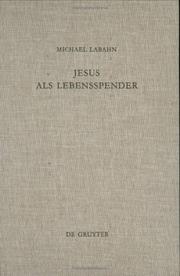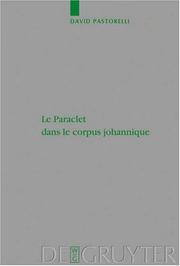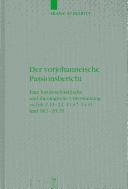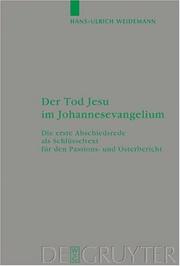| Listing 1 - 10 of 14 | << page >> |
Sort by
|
Book
ISBN: 9780802866356 Year: 2012 Publisher: Grand Rapids, Mi Eerdmans
Abstract | Keywords | Export | Availability | Bookmark
 Loading...
Loading...Choose an application
- Reference Manager
- EndNote
- RefWorks (Direct export to RefWorks)
226.5 --- Evangelie volgens Johannes --- Bible. --- Jean (Book of the New Testament) --- Johanisi (Book of the New Testament) --- Johannesevangelium --- John (Book of the New Testament) --- Yohan pogŭm --- Yohane den (Book of the New Testament) --- Yūḥannā (Book of the New Testament) --- Bible NT. Gospels. John --- Ioganaĭ (Book of the New Testament) --- Иоганай (Book of the New Testament)
Book
ISBN: 9780511979835 9780521509725 9781107442450 9781139190206 1139190202 9781139187619 1139187619 0511979835 1283378388 9781283378383 9781139185301 1139185306 0521509726 1107224098 9781107224094 1139179314 9781139179317 9786613378385 6613378380 1139188895 9781139188890 1139182986 9781139182980 1107442451 Year: 2012 Publisher: Cambridge Cambridge University Press
Abstract | Keywords | Export | Availability | Bookmark
 Loading...
Loading...Choose an application
- Reference Manager
- EndNote
- RefWorks (Direct export to RefWorks)
"The Gospel according to St John, often regarded as the most important of the gospels in the account it gives of Jesus' life and divinity, received close attention from nineteenth-century biblical scholars and prompted a significant response in the arts. This original interdisciplinary study of the cultural afterlife of John in Victorian Britain places literature, the visual arts and music in their religious context. Discussion of the Evangelist, the Gospel and its famous prologue is followed by an examination of particular episodes that are unique to John. Michael Wheeler's research reveals the depth of biblical influence on British culture and on individuals such as Ruskin, Holman Hunt and Tennyson. He makes a significant contribution to the understanding of culture, religion and scholarship in the period"--
Bible. --- Jean (Book of the New Testament) --- Johanisi (Book of the New Testament) --- Johannesevangelium --- John (Book of the New Testament) --- Yohan pogŭm --- Yohane den (Book of the New Testament) --- Yūḥannā (Book of the New Testament) --- Criticism, interpretation, etc. --- Influence. --- Great Britain --- Civilization --- History --- Ioganaĭ (Book of the New Testament) --- Иоганай (Book of the New Testament) --- Arts and Humanities --- Literature
Book
ISBN: 9783161522628 3161522621 Year: 2012 Volume: 336 Publisher: Tübingen Mohr Siebeck
Abstract | Keywords | Export | Availability | Bookmark
 Loading...
Loading...Choose an application
- Reference Manager
- EndNote
- RefWorks (Direct export to RefWorks)
Doctrine of God (christianism) --- Bible NT. Gospels. John --- God --- Fatherhood --- Bible --- Criticism, interpretation, etc --- 226.5 --- Evangelie volgens Johannes --- Fatherhood of God --- Children of God --- Masculinity of God --- Bible. --- Jean (Book of the New Testament) --- Johanisi (Book of the New Testament) --- Johannesevangelium --- John (Book of the New Testament) --- Yohan pogŭm --- Yohane den (Book of the New Testament) --- Yūḥannā (Book of the New Testament) --- Criticism, interpretation, etc. --- Ioganaĭ (Book of the New Testament) --- Иоганай (Book of the New Testament) --- God - Fatherhood
Book
ISBN: 9780567238979 0567238970 Year: 2012 Volume: 458 Publisher: London Clark
Abstract | Keywords | Export | Availability | Bookmark
 Loading...
Loading...Choose an application
- Reference Manager
- EndNote
- RefWorks (Direct export to RefWorks)
This study explores how the Fourth Gospel's use of Scripture contributes to its characterization of Jesus. Utilizing literary-rhetorical criticism, Myers approaches the Gospel in its final form, paying particular attention to how Greco-Roman rhetoric can assist in understanding the ways in which Scripture is employed to support the presentation of Jesus. It offers further evidence in favour of the Gospel's use of rhetoric (particularly the practices of synkrisis, ekpharsis, and prosopopoiia), and gives scholars a new way to use rhetoric to better understand the use of Scripture in the Fourth Gospel and the New Testament as a whole. The book proceeds in three parts. First, it examines ancient Mediterranean practices of narration and characterization in relationship to the Gospel, concluding with an analysis of the Johannine prologue. In the second and third parts, it investigates explicit appeals to Scripture that are made both in and outside of Jesus' discourses. Through these analyses, Myers contends that the pervasive presence of Scripture in quotations, allusions, and references acts as corroborating evidence supporting the evangelist's presentation of Jesus.
Bible --- Socio-rhetorical criticism --- Criticism, Narrative --- 226.5 --- Evangelie volgens Johannes --- Bible. --- Jean (Book of the New Testament) --- Johanisi (Book of the New Testament) --- Johannesevangelium --- John (Book of the New Testament) --- Yohan pogŭm --- Yohane den (Book of the New Testament) --- Yūḥannā (Book of the New Testament) --- Criticism, Narrative. --- Socio-rhetorical criticism. --- Ioganaĭ (Book of the New Testament) --- Иоганай (Book of the New Testament)
Book
ISSN: 01679732 ISBN: 9789004228436 9789004229143 9004229140 9004228438 1280772735 9786613683502 Year: 2012 Volume: 144 Publisher: Leiden ; Boston : Brill,
Abstract | Keywords | Export | Availability | Bookmark
 Loading...
Loading...Choose an application
- Reference Manager
- EndNote
- RefWorks (Direct export to RefWorks)
In The Fourth Gospel and the Scriptures, new insights from 4QXII manuscripts and the Minor Prophets Scroll help unlock the mystery of John’s unique form of scriptural citation. Focusing on 19:37, Bynum argues convincingly that John’s citation from Zechariah is both accurate and historically reliable. Carefully considering the biblical textual milieu of the era brings to light John’s concern for fidelity to the prominent Hebrew text of his day, and for the correctness of the Septuagint form of the citation. From this analysis new light is shed on the critical role the citation plays in the Johannine Passion Narrative, and its meaning within the theological development of the Fourth Gospel.
Bible. --- Criticism, interpretation, etc. --- Relation to Zechariah. --- Quotations in John. --- 226.5 --- 225.06*2 --- Evangelie volgens Johannes --- Gebruik van Oud Testament in Nieuw Testament. Testimonia --- Sacharja (Book of the Old Testament) --- Zacharias (Book of the Old Testament) --- Zechariah (Book of the Old Testament) --- Zekharyah (Book of the Old Testament) --- Jean (Book of the New Testament) --- Johanisi (Book of the New Testament) --- Johannesevangelium --- John (Book of the New Testament) --- Yohan pogŭm --- Yohane den (Book of the New Testament) --- Yūḥannā (Book of the New Testament) --- 225.06*2 Gebruik van Oud Testament in Nieuw Testament. Testimonia --- Ioganaĭ (Book of the New Testament) --- Иоганай (Book of the New Testament)

ISSN: 01716441 ISBN: 3110163012 1306274613 3110810948 3111868826 9783110163018 Year: 2012 Volume: 98 Publisher: Berlin ; Boston : De Gruyter,
Abstract | Keywords | Export | Availability | Bookmark
 Loading...
Loading...Choose an application
- Reference Manager
- EndNote
- RefWorks (Direct export to RefWorks)
Miracles --- Biblical teaching --- 226.5 --- 225*4 --- -God --- Marvelous, The --- Miracle workers --- Spiritual healing --- Supernatural --- Evangelie volgens Johannes --- Mirakels in het Nieuwe Testament --- -Evangelie volgens Johannes --- 225*4 Mirakels in het Nieuwe Testament --- -225*4 Mirakels in het Nieuwe Testament --- Bible. --- Jean (Book of the New Testament) --- Johanisi (Book of the New Testament) --- Johannesevangelium --- John (Book of the New Testament) --- Yohan pogŭm --- Yohane den (Book of the New Testament) --- Yūḥannā (Book of the New Testament) --- Criticism, interpretation, etc. --- Biblical teaching. --- Ioganaĭ (Book of the New Testament) --- Иоганай (Book of the New Testament) --- Miracles - Biblical teaching

ISBN: 3110190451 9783110190458 3110927896 Year: 2012 Volume: 142 Publisher: Berlin ; Boston : De Gruyter,
Abstract | Keywords | Export | Availability | Bookmark
 Loading...
Loading...Choose an application
- Reference Manager
- EndNote
- RefWorks (Direct export to RefWorks)
The Greek term paraklêtos ("paraclete") appears four times in the Gospel of John (Jn 14, 16.26; 15, 26; 16, 7) and once in the First Epistle (1 Jn 2, 1). In the Gospel, its meaning is enigmatic. After a status quaestionis, a detailed analysis of paraklêtos in ancient literature reveals two different degrees of lexicalization: a) an embryonic stage conveying the idea of movement associated with a mandate, to be found in the Gospel (common usage in the Greek language); b) the meaning of "intercesseur", associated with a stereotyped triangular semantic structure, to be found in the Epistle (Jewish tradition). This term demands a moral qualification, supplied by the adjective "righteous" in 1 Jn and by the title "the Spirit of truth" in Jn; an evolution from the Epistle to the Gospel has taken place. The latter uses a term with a minimal semantic value to include it in the mission theme, by means of a recurrent prepositional strategy linked to the preverb para.
Holy Spirit --- History of doctrines --- 226.5 --- Evangelie volgens Johannes --- Biblical teaching. --- Bible. --- Criticism, interpretation, etc. --- Theology. --- Holy Ghost --- Paraclete --- Pneumatology (Theology) --- Spirit, Holy --- Biblical teaching --- Jean (Book of the New Testament) --- Johanisi (Book of the New Testament) --- Johannesevangelium --- John (Book of the New Testament) --- Yohan pogŭm --- Yohane den (Book of the New Testament) --- Yūḥannā (Book of the New Testament) --- God (Christianity) --- Theology, Doctrinal --- Spirit --- Trinity --- Ioganaĭ (Book of the New Testament) --- Иоганай (Book of the New Testament) --- Holy Spirit - Biblical teaching. --- Holy Spirit - History of doctrines - Early church, ca. 30-600. --- Gospel of John.

ISBN: 9783110196986 3110196980 311097861X Year: 2012 Volume: 154 Publisher: Berlin ; Boston : De Gruyter,
Abstract | Keywords | Export | Availability | Bookmark
 Loading...
Loading...Choose an application
- Reference Manager
- EndNote
- RefWorks (Direct export to RefWorks)
Die Aufgabe einer diachronen Analyse des Johannesevangeliums ist in der neueren Forschung zugunsten von Auslegungsmethoden, die sich auf die Endgestalt des Textes konzentrieren, in den Hintergrund gedrängt worden. Zugleich wird neuerdings zunehmend damit gerechnet, dass Johannes die synoptischen Evangelien voraussetzt und kennt.Im Gegensatz zu diesen beiden Forschungstrends rückt F. Schleritt die Frage nach der Genese des vierten Evangeliums in den Mittelpunkt des Interesses und zeigt, dass der von den Synoptikern unabhängige Evangelist den zweiten Teil seines Werkes, aber auch den von der Tempelreinigung handelnden Abschnitt auf der Grundlage eines eigenständigen Berichts über die letzten Tage, die Passion und die Auferstehung Jesu verfasst hat, der auf denselben Erzählzusammenhang wie die von Markus benutzte Leidensgeschichte und eine von Lukas aufgenommene Sonderüberlieferung zurückgeht.Dabei kommt im Vollzug der Analyse und der Interpretation nicht nur die theologische Eigenart der vorjohanneischen Quellenschrift als eines Zeugnisses der Auseinandersetzung früher Christen mit jüdischen Einwänden gegen die Messianität Jesu, sondern auch das spezifisch johanneische Verständnis der Passion und Auferstehung Jesu in den Blick.
Passion narratives (Gospels) --- Bible --- Criticism, interpretation, etc --- 226.5 --- 225*5 --- Evangelie volgens Johannes --- Laatste avondmaal. Proces van Jezus. Lijden. Kruisiging --- 225*5 Laatste avondmaal. Proces van Jezus. Lijden. Kruisiging --- Gospel passion narratives --- Narratives, Passion (Gospels) --- Bible. --- Jean (Book of the New Testament) --- Johanisi (Book of the New Testament) --- Johannesevangelium --- John (Book of the New Testament) --- Yohan pogŭm --- Yohane den (Book of the New Testament) --- Yūḥannā (Book of the New Testament) --- Criticism, interpretation, etc. --- Ioganaĭ (Book of the New Testament) --- Иоганай (Book of the New Testament) --- Gospel of John. --- Passion. --- Synoptic Gospels.
Book
ISBN: 3161519264 9783161519260 Year: 2012 Volume: 329 Publisher: Tübingen Mohr Siebeck
Abstract | Keywords | Export | Availability | Bookmark
 Loading...
Loading...Choose an application
- Reference Manager
- EndNote
- RefWorks (Direct export to RefWorks)
Peter, --- Bible --- Criticism, interpretation, etc --- 225-05 --- 226.5 --- 225-05 Personen in het Nieuwe Testament. Apostelen --- Personen in het Nieuwe Testament. Apostelen --- Evangelie volgens Johannes --- Petrus --- Pierre --- Peter --- Cephas, --- Pedro, --- Petrus, --- Pietro, --- Simon Bar Jona, --- Simon Peter, --- Simon Petrus, --- Bible. --- Jean (Book of the New Testament) --- Johanisi (Book of the New Testament) --- Johannesevangelium --- John (Book of the New Testament) --- Yohan pogŭm --- Yohane den (Book of the New Testament) --- Yūḥannā (Book of the New Testament) --- Criticism, interpretation, etc. --- Ioganaĭ (Book of the New Testament) --- Иоганай (Book of the New Testament) --- Peter, - the Apostle, Saint

ISBN: 3110181037 3110896044 9783110181036 Year: 2012 Volume: 122 Publisher: Berlin ; Boston : De Gruyter,
Abstract | Keywords | Export | Availability | Bookmark
 Loading...
Loading...Choose an application
- Reference Manager
- EndNote
- RefWorks (Direct export to RefWorks)
Der Tod Jesu wird im Johannesevangelium in diskursiven wie narrativen Texten thematisiert. Die Arbeit geht im Anschluss an Joh 14,29 davon aus, dass die erste Abschiedsrede (13,31-14,31) mit ihrer Eschatologie und Pneumatologie, aber auch der angekündigten Konfrontation Jesu mit dem Teufel der Schlüssel- und Kommentartext für den Passions- und Osterbericht (Joh 18-20) ist. Zur Erhebung des theologischen Verständnisses vom Tod Jesu werden beide Textcorpora detailliert und in ihren gegenseitigen Bezügen in synchroner wie diachroner Hinsicht analysiert. In the Gospel of John, Jesus' death is taken as a theme in discoursive and narrative texts. Starting with John 14,29 the study works from the premise that the first farewell speech (John 13,31-14,31) with its eschatology and pneumatology, but also with its announcement of Jesus' confrontation with the Devil, is the key text and commentary for the Passion and Easter story (John 18-20). To enhance the theological understanding of Jesus' death, both text corpora are examined in detail and in their interrelationships from both a synchronic and diachronic perspective.
226.5 --- 225*5 --- Evangelie volgens Johannes --- Laatste avondmaal. Proces van Jezus. Lijden. Kruisiging --- 225*5 Laatste avondmaal. Proces van Jezus. Lijden. Kruisiging --- Jesus Christ --- Crucifixion --- Biblical teaching. --- Resurrection --- Bible. --- Criticism, interpretation, etc. --- Christologie. --- Johannesevangelium. --- Ostern. --- Passion. --- Exegese --- RELIGION / Biblical Criticism & Interpretation / New Testament. --- Bibelauslegung --- Bibelexegese --- Biblische Auslegung --- Bibelinterpretation --- Biblische Exegese --- Schriftauslegung --- Bibelwissenschaft --- Exeget --- Bibel --- Christ --- Cristo --- Jezus Chrystus --- Jesus Cristo --- Jesus, --- Christ, Jesus --- Yeh-su --- Masīḥ --- Khristos --- Gesù --- Christo --- Yeshua --- Chrystus --- Gesú Cristo --- Ježíš --- Isa, --- Nabi Isa --- Isa Al-Masih --- Al-Masih, Isa --- Masih, Isa Al --- -Jesus, --- Jesucristo --- Yesu --- Yeh-su Chi-tu --- Iēsous --- Iēsous Christos --- Iēsous, --- Kʻristos --- Hisus Kʻristos --- Christos --- Jesuo --- Yeshuʻa ben Yosef --- Yeshua ben Yoseph --- Iisus --- Iisus Khristos --- Jeschua ben Joseph --- Ieso Kriʻste --- Yesus --- Kristus --- ישו --- ישו הנוצרי --- ישו הנצרי --- ישוע --- ישוע בן יוסף --- المسيح --- مسيح --- يسوع المسيح --- 耶稣 --- 耶稣基督 --- 예수그리스도 --- Jíizis --- Yéshoua --- Iėsu̇s --- Khrist Iėsu̇s --- عيسىٰ --- Jean (Book of the New Testament) --- Johanisi (Book of the New Testament) --- Johannesevangelium --- John (Book of the New Testament) --- Yohan pogŭm --- Yohane den (Book of the New Testament) --- Yūḥannā (Book of the New Testament) --- Ioganaĭ (Book of the New Testament) --- Иоганай (Book of the New Testament)
| Listing 1 - 10 of 14 | << page >> |
Sort by
|

 Search
Search Feedback
Feedback About UniCat
About UniCat  Help
Help News
News